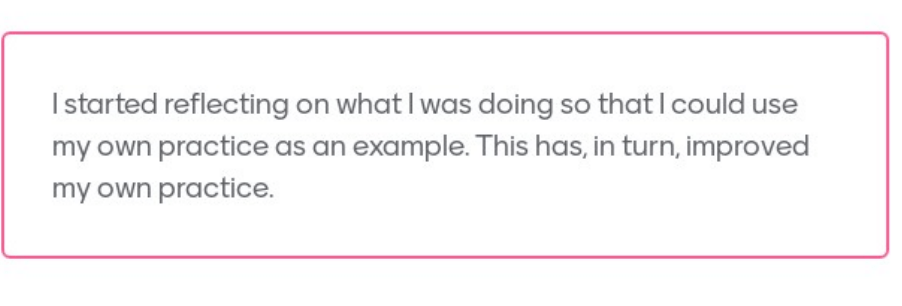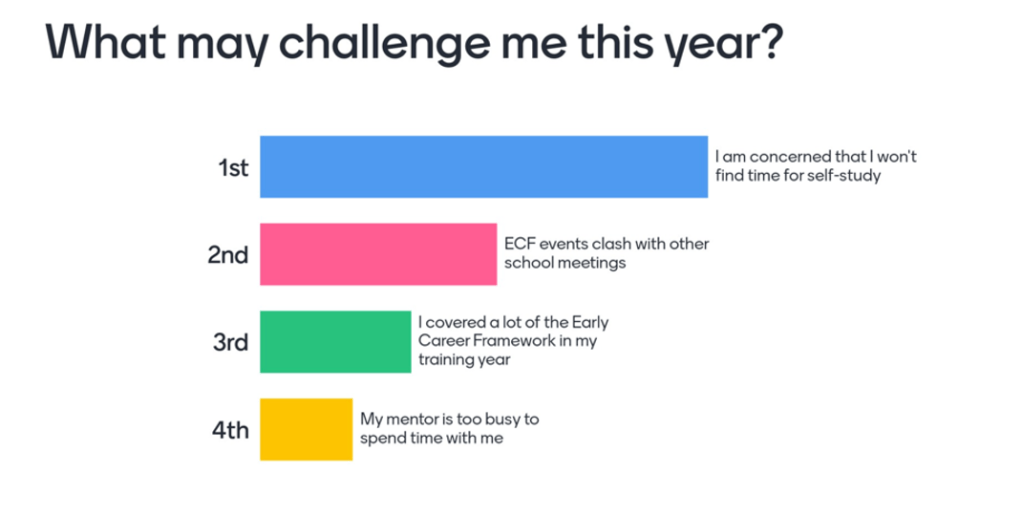UCL ECF Wellbeing Charter

We are ambitious for you. Our UCL ECF teacher development programme is unashamedly packed full of knowledge, research and academic rigour. It is overflowing with the wealth of wisdom accumulated by the world leading Institution of Education, ready to burst with the volume of expertise poured into the making of it.
However, we are also realistic. As much as we have tapped into the rich reservoir of research our unique university setting has to offer, us ECF programme leaders also have skin in the game. With over 70 years combined experience working in schools as teachers, mentors, induction tutors and senior leaders, we have walked in your shoes and understand how hard it can be. Once upon a time, we were that worried ECT, that mentor who pulls you up when you need it most, that induction tutor who you later admit gave you really good feedback (even though you really hated the constructive criticism at the time).
We know that you ECTs come with bags full of passion, talent and prior knowledge. Our programme will tap into every bit of that. However, we also know that you are not all the same. You have come from different ITE routes, have varying levels of experience in the classroom and that our programme is only as good as the extent to which you can apply it to your schools in your classrooms to help your pupils.
So how do we we balance our ambition, your talent and the undeniably heavy workload of early career teachers? Well as much as our programme is rich in academic rigour, it is also awash with opportunities for autonomy and flexibility; malleable enough to be shaped to your individual needs. Our wellbeing charter details how:

Let’s cut to the chase. If there is one thing busy teachers need, it’s the freedom to manage their own time. Therefore, we have made sure that you can access the materials anytime, anywhere. Multi- task by popping your air pods in and listening to a research and practice summary on your commute to work; or if you prefer, download a module’s worth at once and curl up in a comfy chair to absorb them. The choice is yours.
We recognise that everyone’s path needs to be different. Use our module guides and self audits to navigate your way through each module. If you are very confident in one of the statements, make it a short pit stop in your weekly self study. Not so confident? Make it a longer stop. Tailor your hour accordingly, but never spend longer than an hour on your self study. There are no quizzes to worry about, no tests at the end. You are not being assessed or timed. It is as simple as review, tailor, tick!

What’s more, we have made sure your mentors will be well supported in being on your side. They are are not there to judge you, so you should feel free to share both your triumphs and mistakes with them (we have all been that person dealing with the after effects of a lesson that looked really good on paper-don’t ask me about the time I thought it would be a good idea to simulate a chat show with my Year 10s on a Friday afternoon!)
You will also get to know your facilitators and your learning community very well. Your facilitators will challenge you and exploit those bags full of talent and dedication you have, but they will also support you pastorally. They will be the best listening ear if you need it. Make sure you get to know your peers well. As well as rejoicing in their camaraderie, listen out for all the exciting settings they work in. In Year 2 of the programme, you will have the opportunity to set up a school visit, so you will want to be well placed to take advantage of all the new connections you have made!
Of course, we know you won’t want to miss out on the warm embrace of your learning community, but we also know there may be the odd occasion when you really can’t get to your session because it clashes with an in school event . If this happens, don’t hesitate to contact your Delivery Partner to see if you can attend a different session, or if that doesn’t work out, you can still gain your attendance mark by watching the recording. These are available on UCL Extend at the end of the week the training session was due to take place.
Finally, as much as we have tapped into our vast well of educational research to write the programme, we know that we don’t have all the answers. There is still a world of pupils out there waiting to benefit from research yet to be conducted by ECTs such as you. That’s why in Year Two of the programme we invite you to contribute to the conversation by conducting your own research in the form of practitioner inquiries. We believe nobody knows what works better than teachers on the ground, and hope you will take advantage of this opportunity for your voice to be heard in your departments, schools and the wider UCL community.
Therefore, we pledge that we will push you; we pledge that we will support you; but most of all, we pledge that we will make you part of the conversation.










